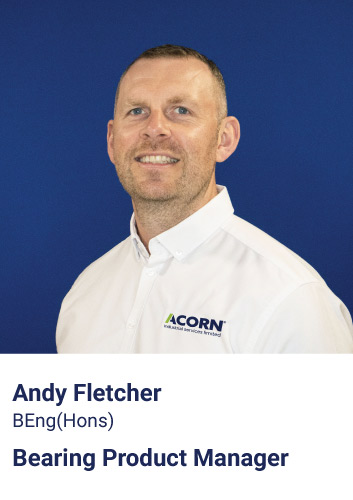Expert collaboration to keep the Windermere Ferry running
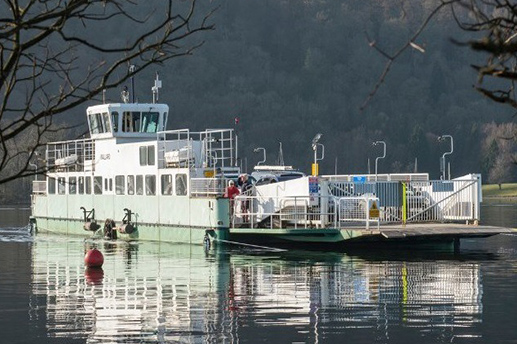
What do you do when a passenger ferry is in its latter years, but still needs to perform? Well, in the case of Westmorland and Furness Council, you call in the marine experts. Here, George Sowerby, lead highways operations manager for Westmorland and Furness Council (opens new window), shows how bringing in Acorn Industrial Services, MIT and other marine consultants is turning around the fortunes of The Mallard passenger ferry in Windermere, Cumbria.
Find out more about our services here
The maintenance needs
The Mallard was introduced in 1990 to take passengers and cars from Ferry Nab in Bowness to Sawrey near Hawkshead, cutting the considerable journey time by car down from 50 minutes to 10 minutes across Lake Windermere. 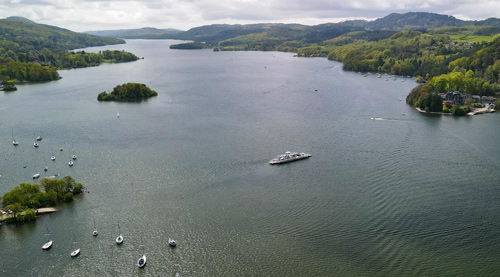 However, over the years the ferry’s reliability had become inconsistent and a source of frustration to users and the Council alike. With a remit to deliver the best service possible, the team at Westmorland and Furness Council called in two specialist companies in the Axel Johnson International group (opens new window) to help. Engineering component suppliers, Acorn Industrial Services and marine consultants MIT were tasked with assessing The Mallard’s maintenance needs and resolving its reliability issues.
However, over the years the ferry’s reliability had become inconsistent and a source of frustration to users and the Council alike. With a remit to deliver the best service possible, the team at Westmorland and Furness Council called in two specialist companies in the Axel Johnson International group (opens new window) to help. Engineering component suppliers, Acorn Industrial Services and marine consultants MIT were tasked with assessing The Mallard’s maintenance needs and resolving its reliability issues.
Remedial work on any marine vessel can be challenging, but The Mallard presented the team with a very specific set of challenges. Due to the age of the vessel, a lot of the parts that were needed to ensure reliability were non-standard. Also, unlike traditional roll-on roll-off ferries that rely on propulsion, The Mallard is set up on cable drums that enable it to pull itself across the lake. This makes it straightforward to operate, as the vessel is kept in alignment by the cables during the crossing, however it means that it has an unusual drive chain and is expensive to move into dry dock.
Phase 1 - servicing and maintenance
Initially, Acorn and MIT were called in to fit, fix and change drive chain parts specified by an existing civil engineering firm carrying out servicing and maintenance work on The Mallard. When checking the job they were asked to do, their many years of experience led them to quickly realise that for the ferry to work properly a full set of bearings and the replacement of the coupling on the driveline were needed. Westmorland and Furness Council was very keen to take on board their advice, to ensure that The Mallard could operate to its best moving forwards.
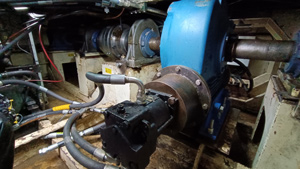 With the challenge being to get the ferry up and operational again as quickly as possible, Acorn used the team’s wide-ranging expertise to source and supply all the parts needed for MIT to repair the vessel as quickly as possible.
With the challenge being to get the ferry up and operational again as quickly as possible, Acorn used the team’s wide-ranging expertise to source and supply all the parts needed for MIT to repair the vessel as quickly as possible.
Acorn and MIT’s commitment to doing a good job ensured that the ferry was operational again, in time for the busy summer season. On completion of this phase of the maintenance work, George Sowerby comments: “the companies worked in collaboration to ensure that no stone was left unturned to solve any problems encountered, rather than having a ‘make do’ approach.”
A roadmap to more reliable operation
However, with MIT and Acorn highlighting a range of other maintenance and repair issues that would impact long-term reliability, the council enlisted their expertise to do more extensive repairs over a two-week period in the quieter winter months. George Sowerby explains further: “It is no secret that The Mallard has become increasingly unreliable over recent years.
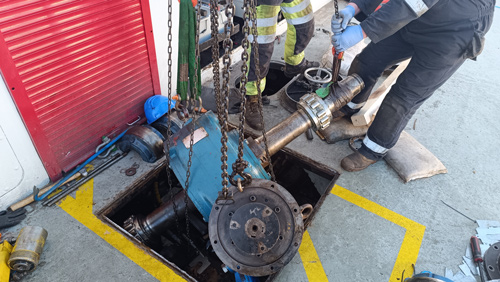 We needed to find a way to deliver the best possible service and minimise break downs. Following the work with MIT and Acorn earlier in the year, it became clear that they were the right team of marine engineers and component supplier to help us improve the ferry’s reliability and longevity. They gave us a better understanding of the unique challenges that The Mallard faced and a roadmap to overcoming them.”
We needed to find a way to deliver the best possible service and minimise break downs. Following the work with MIT and Acorn earlier in the year, it became clear that they were the right team of marine engineers and component supplier to help us improve the ferry’s reliability and longevity. They gave us a better understanding of the unique challenges that The Mallard faced and a roadmap to overcoming them.”
Navigating the non-standard
Since the initial remedial work had exposed more extensive issues, a plan of action was devised by MIT and Acorn to change the rest of the bearings and couplings, the deep sea seals and the main Radicon gearbox. Also, shaft alignment issues needed to be resolved. Due to the difficulty and expense of moving The Mallard from its cables to a slip way, the work was done in-situ with rafts used alongside the ferry to accommodate the additional repair work. The team from MIT navigated the winter weather, long working days in confined spaces and a range of engineering issues to ensure The Mallard could get back to work as quickly as possible.
![]()
Due to the ferry’s unique design, a lot of bespoke engineering solutions were required and Acorn worked with its suppliers, who often worked through the night, to deliver specialised solutions to get the job done. A case in point is the deep seal component. It became clear when attempting to clamp the deep sea seal back into place that the standard part originally sourced by the council - according to the drawing that was supplied with the boat - it wasn’t the right size.
This led Acorn to quickly respond by making a drawing of the needed replacement component and have one of their specialist machine shop suppliers in Barrow in Furness work through the night to create the specialist solution for next day fitting. Another example was the coupling hubs and deep sea seal wear rings. MIT had removed and cleaned these up to be used as patterns for machining new parts, however, all the coupling components needed to be machined individually as opposed to in a batch, due to diameter and taper dimensions differing from hub to hub.
Improved reliability through collaboration
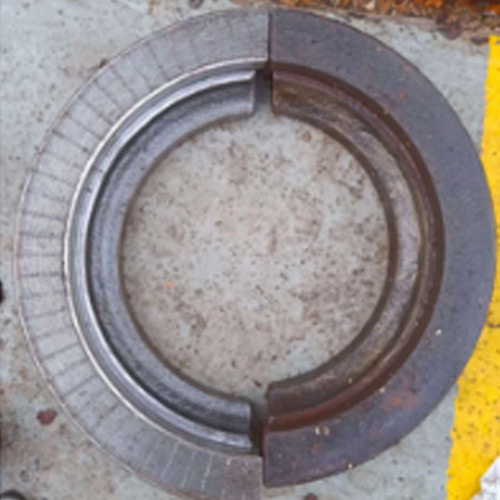 All the work carried out by MIT and Acorn was undertaken with the aim of increasing The Mallard’s reliability. For instance, to improve the ferry’s drive line torque accuracy and alignment and to reduce maintenance, the team replaced the shear pin couplings with wedge type gear couplings. Acorn also worked closely with MIT to work out the generated torque in the ferry’s duty cycle, so as the right wedge pins would be specified for the couplings.
All the work carried out by MIT and Acorn was undertaken with the aim of increasing The Mallard’s reliability. For instance, to improve the ferry’s drive line torque accuracy and alignment and to reduce maintenance, the team replaced the shear pin couplings with wedge type gear couplings. Acorn also worked closely with MIT to work out the generated torque in the ferry’s duty cycle, so as the right wedge pins would be specified for the couplings.
Chris Britner, MIT Operations Manager, comments on the job: “Although we are highly experienced marine transmission specialists, The Mallard created a range of problems that required us to work closely with Acorn to get the transmission’s refurbishment done in the shortest time-frame possible. Despite having to machine a wide range of new, specialist parts and trouble-shoot a lot of unexpected issues with the ferry, working with Acorn, we were able to deliver the ferry back to working order within a few weeks.”
Philip Mclaughlin, Regional Manager at Acorn Industrial Services continues : “Our primary aim has been to build resilience back into The Mallard. We pride ourselves on always doing the best job and to this end, we worked closely with the council to advise them on the best practices for extending The Mallard’s operational life. With over £7million of stock held here at Acorn, our experience in sourcing bespoke solutions, and by maximising our partnership with MIT we have been able to pull in all the expertise needed to do a good job for Westmorland and Furness Council. We have also ensured that the council now has detailed specifications of every part in the drive chain. However, following this work, undertaken to mitigate some of the higher forces being imposed on the ferry’s drive line, gear box and transmission, we are now looking at how to further improve The Mallard’s reliability through resolving the amount of torque going through the shaft.”
: “Our primary aim has been to build resilience back into The Mallard. We pride ourselves on always doing the best job and to this end, we worked closely with the council to advise them on the best practices for extending The Mallard’s operational life. With over £7million of stock held here at Acorn, our experience in sourcing bespoke solutions, and by maximising our partnership with MIT we have been able to pull in all the expertise needed to do a good job for Westmorland and Furness Council. We have also ensured that the council now has detailed specifications of every part in the drive chain. However, following this work, undertaken to mitigate some of the higher forces being imposed on the ferry’s drive line, gear box and transmission, we are now looking at how to further improve The Mallard’s reliability through resolving the amount of torque going through the shaft.”
George Sowerby concludes: “Here at Westmorland and Furness Council, we are doing everything within our power, to provide the best service we can with The Mallard. It is no small feat to overcome the challenges of working with a bespoke vessel that was designed over thirty years ago and has had several modifications. There is still more work to do, but thanks to the work by MIT and Acorn we are in a much better place than we were a year ago and we now have much better understanding of The Mallard’s future maintenance needs.”
For more information contact Acorn Industrial Services on 0800 8766 441, or email: enquiries@acorn-ind.co.uk
For more information about our services contact Andy today
